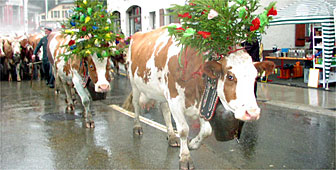Cows come home to St Cergue

For farmers and the tourist industry alike, the changing of the seasons is something to celebrate, and for the town of St Cergue, nestled in the Jura mountains in the west of canton Vaud, the day the cows return from their summer pastures is of special significance.
St Cergue is one of only a handful of towns in French-speaking Switzerland to hold a special festival devoted to the centuries-old practice of transhumance – bringing the herds down from the mountains for the winter months – and probably the only one not in the Alps.
Here, the festival is known as the Désalpe, and even persistent rain failed to deter around 5,000 people from cramming into this normally quiet and unassuming town to witness the event.
They saw seven herds being driven through the narrow streets by men and boys in traditional “Bredzon” costumes – a short-sleeved, embroidered black jacket over a long-sleeved white shirt.
Noise, and bewildered cattle
The sound made by some 500 cowbells was deafening, and many of the animals, labouring under the weight of sodden floral headdresses, seemed bewildered by the occasion.
“This is the most important annual event in St Cergue – the event that attracts the biggest number of visitors,” says René Lang, head of the town’s tourist office.
People come from France – which lies just a few kilometres away, as well as from cities and towns like Geneva, Lausanne and Montreux. Many among the throng were from countries that have perhaps lost this link with rural traditions.
“A lot of people come here to rediscover their roots,” Lang told swissinfo.
Although it celebrates a tradition stretching back centuries, the festival itself began just 14 years ago. It has since grown into a major focal point for the southern end of the Jura mountains, which lie to the north of Geneva. As well as the cows, there are folk music, traditional crafts and, of course, a fine array of Swiss food to be savoured.
Rooted in folklore
The Désalpe in St Cergue has grown in importance largely for logistical reasons. The descent of the cattle requires the closure of a main road, and it makes sense for as many herds as possible to make the trip together on the same day.
For the people in the village, many of whom commute to nearby Nyon and Geneva, this is primarily a festival rooted in folklore. For the farmers, it is still, to a certain extent, a reflection of their working lives
“The farmers could easily bring their herds down from the mountains in lorries. But they make a special effort, because they feel it is important to maintain those links,” Lang explains.
“The people of St Cergue are no longer country folk,” says Rose-Marie Bosson, the main organiser of the event.
“But it is still an important event. We know it’s the end of Summer and the start of the Autumn. We have to prepare for worse weather,” she adds, looking at the rain pouring on the revellers outside.
Despite the dreary weather, the Autumn can be a wonderful season for walking in the heavily wooded Jura. And for the tourist industry, the Désalpe is a timely reminder that the busiest time of the year is round the corner.
“Apart from the Désalpe, St Cergue is best known for its cross-country skiing. Once the cows have come down from the mountain, we can start gearing up for that,” René Lang says.
by Roy Probert

In compliance with the JTI standards
More: SWI swissinfo.ch certified by the Journalism Trust Initiative








You can find an overview of ongoing debates with our journalists here . Please join us!
If you want to start a conversation about a topic raised in this article or want to report factual errors, email us at english@swissinfo.ch.